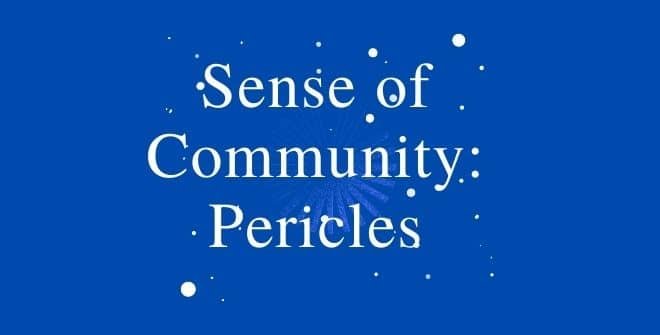Other factors were equally important in shaping Greek political thought. Foremost among these were a sense of community and a spirit of camaraderie which have few modern parallels.
The lives of Athenians were not as compartmentalized as ours often are. Distinctions between public and private interests melted away into a common concern for the community. They would not, moreover, have been able to understand the wide distrust of government which we have not yet completely lost, They sought happiness through government, not despite it. Added to this was a sense of neighborliness and friendship which is known by people intimately sharing the same problems under isolated and often adverse circumstances.
Much of this has been lost in our impersonal world where many people scarcely know their next-door neighbors. But the life of the marketplace, the love of discussion, and the values people shared left no room for such an occurrence in Athens Of the common values, none was more important than religion.
Gods were community gods presiding over the city in a personal and compassionate way. Legends relate that they laughed and cried loved and hated, and in other ways acted not very differently from ordinary people. More than this, Athenian religion was surprisingly undogmatic when compared with its Oriental counterpart. Little was required of its adherents, religion being a matter of individual conscience.
The Greeks therefore had no priestly caste controlling thought or exercising authority. This left room for all to play a greater or lesser part as they desired; with the result that religion became more of a ceremonialized expression of unity and love of the city than a more formal expression of fixed religious beliefs.
Other things were held in common as well. Greek architecture was always a matter of public concern, as were other forms of art. Many commercial enterprises were owned and operated by the city, such as the mines. But these facts only serve to illustrate the fundamental conclusion that Greek life was a life in common. The vividness of the feeling of community, the approximation of neighborliness and citizenship, the living realization of a true res public a or common weal these were the deepest roots from which Athens drew its life.
Nowhere is this sense of community better expressed than in Pericles Funeral Oration, as related by Greece’s greatest historian, Thucydides. The war with Sparta has just begun. The first of the dead have been returned home. And in commemoration of their service Pericles, the foremost Athenian, begins his public accounting of the greatness of Athens and the men who died for her.
Our constitution does not copy the laws of neighboring states; we are rather a pattern to others than imitators ourselves. Its administration favors the many instead of the few; this is why it is called a democracy. If we look at the laws, they afford equal justice to all in their private differences, if to social standing, advancement in public life falls to reputation for capacity, class considerations not being allowed to interfere with merit, nor again does poverty bar the way, if a man can serve the state, he is not hindered by the obscurity of his condition.
If we turn to our military policy there also we differ from our antagonists. Our rivals from their very cradles by a painful discipline seek after manliness, at Athens we live exactly as we please, and yet are just as ready to encounter every legitimate danger.
Nor are these the only points in which our city is worthy of admiration. We cultivate refinement without extravagance and knowledge without effeminacy wealth we employ more for use than for show, and place the real disgrace of poverty not in owning to the fact but in declining the struggle against it.
Our public men have, besides politics, their private affairs to attend to, and our ordinary citizens, though occupied with the pursuits of industry, are still fair judges of public matters; for unlike any other nation, regarding him who takes no part in these duties not as unambitious but as useless, we Athenians can judge at all events if we cannot originate, and instead of looking on discussion as a stumbling-block in the way of action, we think it an indispensable preliminary to any wise action at all. In short, I say that as a city we are the school of Hellas,
In these memorable passages, Pericles summed up all that was best in Athenian democracy. Much, of course, was left unsaid, as Plato in condemning democracy was later to point out. But as the statement of an ideal and as evidence of community pride, it leaves little to be desired.

